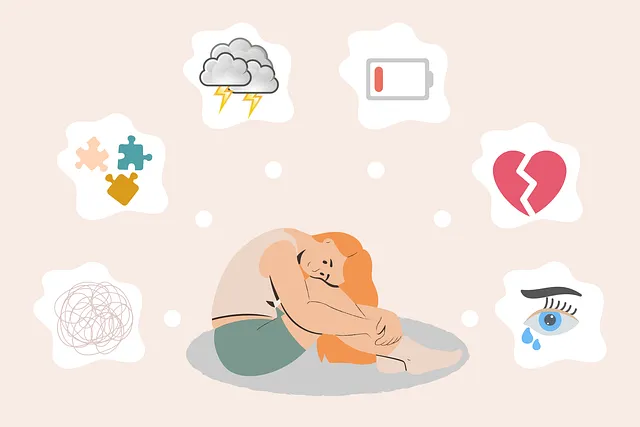Kaiser Permanente's holistic mental health facility in Centennial prioritizes stress management by offering comprehensive assessments, tailored programs, and inclusive techniques like mindfulness and cognitive behavioral therapy. They empower patients through education, coaching, and interactive activities to build resilience, prevent burnout, and integrate self-care routines into daily life, measuring success through participant feedback and data-driven metrics.
At Kaiser Permanente’s Centennial facility, a focused approach on mental health includes teaching stress management techniques. This comprehensive strategy recognizes that chronic stress significantly impacts overall well-being. By equipping patients with effective tools, the program aims to foster resilience and improve mental health outcomes. Through exploring various methods, from mindfulness practices to holistic therapies, this article delves into the importance, implementation, and measurement of these teachings, highlighting Kaiser Permanente Centennial’s commitment to empowering individuals in managing stress effectively.
- Understanding Stress: A Focus on Mental Health at Kaiser Permanente Centennial
- The Importance of Teaching Effective Stress Management Techniques
- Creating a Holistic Approach to Stress Relief at the Facility
- Interactive Strategies for Engaging Patients in Learning and Growth
- Measuring Success: Evaluating the Impact of Stress Management Programs
Understanding Stress: A Focus on Mental Health at Kaiser Permanente Centennial

At Kaiser Permanente Centennial, understanding stress goes beyond mere physical strain; it delves into the intricate interplay between mental health and overall well-being. This renowned mental health facility recognizes that stress management is not just a wellness practice but a crucial component of preventing burnout among professionals. By prioritizing comprehensive stress assessment, Kaiser Permanente helps its patients and staff navigate the complexities of modern life.
Through various programs and initiatives, the center offers valuable insights into identifying and managing stress, focusing on both individuals and mental health professionals alike. This holistic approach to stress management is vital in mitigating risks associated with prolonged exposure to stressful environments. By fostering a culture of mindfulness and resilience, Kaiser Permanente Centennial ensures that its services not only treat but also empower individuals to face life’s challenges head-on.
The Importance of Teaching Effective Stress Management Techniques

Teaching effective stress management techniques is a vital component of holistic healthcare, especially within renowned facilities like Kaiser Permanente’s mental health facility in Centennial. With an increasing focus on well-being and mental health awareness, equipping individuals with coping strategies has become more crucial than ever. This proactive approach not only empowers people to navigate stressful situations but also fosters resilience and overall life satisfaction.
At the heart of this practice lies the integration of evidence-based methods, such as mindfulness and cognitive behavioral therapy, which have proven effective in reducing stress levels. By incorporating cultural sensitivity in mental healthcare practice, these techniques can be tailored to meet diverse needs, ensuring inclusivity and accessibility for all. The Mind Over Matter principles encourage individuals to develop emotional intelligence, enabling them to understand and manage their emotions, thereby enhancing their ability to cope with life’s challenges.
Creating a Holistic Approach to Stress Relief at the Facility

At the Kaiser Permanente mental health facility Centennial, a holistic approach to stress relief is cultivated through an integrated network of programs and practices. Beyond traditional therapy sessions, the facility emphasizes the importance of Compassion Cultivation Practices, which help individuals develop empathy and resilience in the face of stress. This involves mindfulness exercises, meditation techniques, and fostering supportive communities within the facility.
Additionally, Mental Health Education Programs Design plays a crucial role in empowering patients to understand their stress triggers and implement effective coping strategies. These programs are tailored to individual needs, promoting self-care habits that extend beyond the walls of the facility. Furthermore, Mental Wellness Coaching Programs Development focuses on pairing individuals with coaches who provide personalized guidance and accountability, fostering sustainable mental wellness over time.
Interactive Strategies for Engaging Patients in Learning and Growth

At the Kaiser Permanente mental health facility in Centennial, interactive strategies are employed to actively engage patients in their learning and personal growth journeys. These approaches recognize that involving individuals in their care process fosters a deeper understanding of stress management techniques. Through dynamic activities and discussions, patients learn not only practical tools like mindfulness meditation but also develop a strong foundation for self-care routine integration.
The focus on interactive learning extends beyond the session, empowering patients to apply burnout prevention strategies for healthcare providers they acquire in their daily lives. By encouraging active participation, Kaiser Permanente ensures that individuals leave with tangible skills and increased mental health resilience, setting them up for success in managing stress effectively.
Measuring Success: Evaluating the Impact of Stress Management Programs

Measuring success is a vital aspect of evaluating the effectiveness of stress management programs, particularly in esteemed institutions like Kaiser Permanente’s mental health facility in Centennial. This process involves assessing the impact and outcomes of implemented strategies on individuals’ well-being and overall mental health. One way to gauge success is by collecting and analyzing feedback from participants, which provides valuable insights into their experiences and perceived improvements.
The evaluation can encompass various metrics, such as self-reported changes in stress levels, improved emotional regulation, enhanced coping mechanisms, and increased job satisfaction among mental health professionals. For instance, a program focusing on risk management planning for mental health professionals might show success through higher ratings of self-esteem improvement and better stress management techniques. This data-driven approach ensures that the facilities can continually refine and adapt their programs to meet the evolving needs of both staff and clients, fostering a healthier and more productive environment at Kaiser Permanente’s Centennial location.
At Kaiser Permanente Centennial, recognizing the profound impact of stress on mental health has led to a comprehensive approach in teaching effective stress management techniques. By integrating holistic strategies and interactive learning experiences, the facility empowers patients to take control of their well-being. The success of these programs is evident through measured improvements in patient outcomes, demonstrating that investing in stress management education is a valuable asset for any mental health facility, including Kaiser Permanente Centennial.






